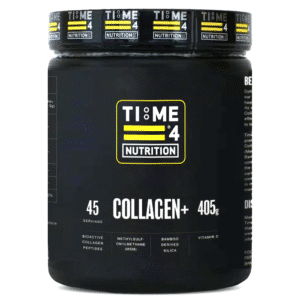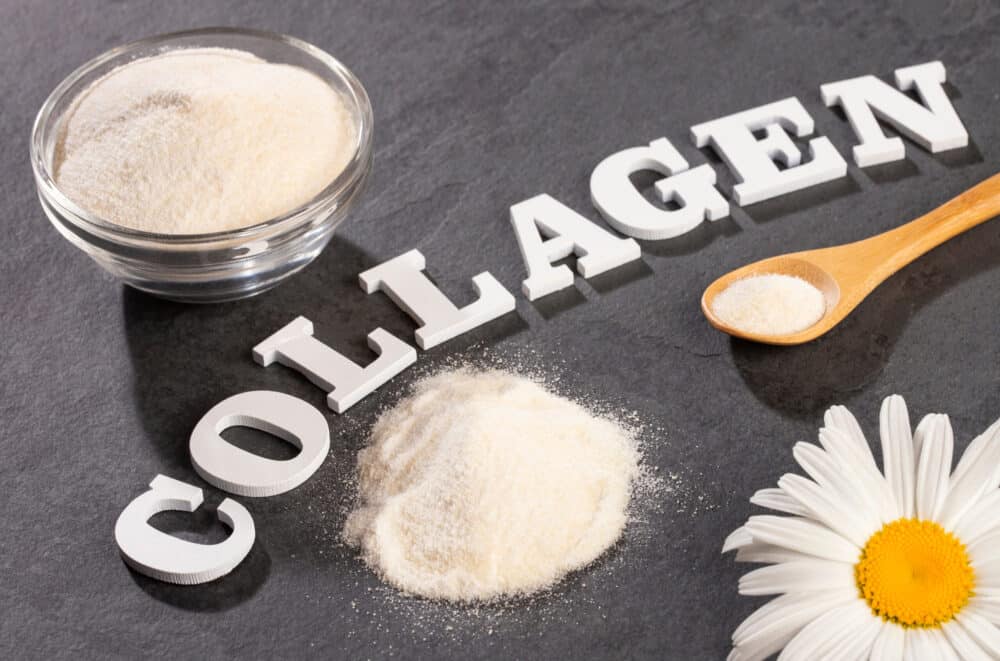What is the Best Collagen Supplement?
What is the Best Collagen Supplement?
What is the Best Collagen Supplement? – The Benefits Of Collagen.
(Click on the Reference Numbers in Blue for More Info)
There is perhaps a tendency to associate collagen with healthy skin, hair and nails. This is not without good reason, as it is an essential component of all of these. Less well known is that collagen is also an essential component of muscle, tendon, bone, teeth and blood vessels, and is often considered to be the ‘glue’ that holds these structures together.
In fact, collagen is the most abundant protein in the body, accounting for approximately 35% of its total protein content and as much as 70% of the protein in our skin. It consists of Amino Acids bound together into fibres to form connective tissue which provides structural support, strength, elasticity and protective coverings throughout the body.
Consequently, Collagen plays a vital role in our health, performance and appearance. Unfortunately, as we age, our body produces less and that which it does produce is of a lower quality. It is estimated that we begin to lose about 1% of our Collagen per year in our mid-20s and a woman may lose as much as 30% during the first five years of menopause. The visible consequences of this are sagging skin and wrinkles. Also, wounds heal less quickly. You may experience a loss of flexibility as tendons and ligaments stiffen, and become weaker as muscle mass is lost. Less obvious is the weakening of the cartilage within our joints that accompanies a reduction in Collagen, which is implicated in the development of osteoarthritis.
It is not only ageing which affects our ability to produce sufficient levels of high-quality collagen, but also our diet and lifestyle. We need to ensure that we consume a diet which provides sufficient amounts of high-quality protein and other less obvious but still vital nutrients including vitamin C, the amino acids proline and glycine and the mineral copper.
We need to avoid consuming a diet high in sugar and refined carbohydrates, as these can reduce the body’s ability to produce and repair Collagen.
Other lifestyle factors can also affect our Collagen levels. For example, smoking and excessive sun exposure both inhibit Collagen production.
This is where Time 4 Collagen + can be a valuable addition to your diet. Here at Time 4 Nutrition, we pride ourselves on employing the findings of latest cutting-edge research to produce the most effective and innovative products. In this article, we are going to review some of that research and explain how there’s a lot more to Time 4 Collagen + than the name suggests.
What is the Best Collagen Supplement?: What’s in Time 4 Collagen+?
Time 4 Collagen + is a potent combination of natural substances designed to enhance the body’s production of Collagen. These include Peptiplus® Hydrolysed Collagen, Vitamin C, Bamboo Derived Silica, and Methylsulfonylmethane (MSM).
These key ingredients have been shown scientifically to provide a number of potential benefits for health and performance.
These include, but are not limited to:
- Increasing Collagen (5, 9, 11, 14, 32, 34)
- Increasing muscle mass (1, 2, 3, 4)
- Increasing muscular strength (1, 2, 3, 4)
- Enhancing post-exercise recovery (10, 21, 23, 24, 25, 26, 27, 28, 29, 30)
- Enhancing post-injury tissue repair (5, 6)
- Reducing joint pain (7, 8, 9, 18, 19, 20, 21, 22, 30)
- Reducing Oxidative Stress (23, 24, 28, 29, 33)
- Reducing inflammation (22, 24, 25)
- Improving bone health (9, 15, 16, 33, 34)
- Enhancing skin health and appearance (11, 12, 13, 14, 31, 32, 35)
- Enhancing hair health and appearance (35)
- Enhancing nail health (17, 35)
As we look at each of these ingredients in-depth, you’ll begin to see why Time 4 Collagen + is such a great product and how it may benefit you.
What is Peptiplus® Hydrolysed Collagen?
Peptiplus® is a pure source of hydrolysed Collagen protein. It is neutral in taste and odour, mixes easily, and is fat, cholesterol and carbohydrate free.
Why Peptiplus® Hydrolysed Collagen?
Peptiplus® is produced by Gelita, one of the world’s leading manufacturers of collagen products. The effectiveness of Gelita collagen supplements has been demonstrated in a range of studies (1, 2, 3, 4, 6, 15).
Why Use Hydrolysed Collagen?
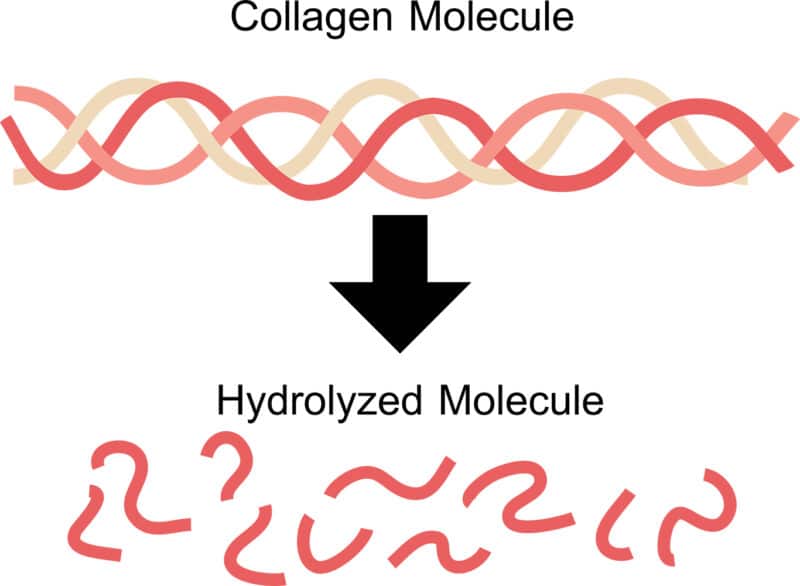
The process of hydrolysation increases its absorption rate and bioavailability (36), helping to ensure that you get the vital amino acids to where they are needed to optimise their potential benefits.
What is the Best Collagen Supplement?: How Will Hydrolysed Collagen Benefit Me?
In addition to increasing the body’s store of Collagen (5, 9, 11, 14,) supplementation with hydrolysed Collagen has been shown to help increase muscle mass and strength (1, 2, 3, 4,), enhance tissue repair after injury (5, 6), reduce joint pain (7, 8, 9), enhance post-exercise recovery (10), improve bone (9, 15, 16) and nail health (17), and increase skin health and appearance(11, 12, 13, 14).
Here are just a few examples of the many studies which demonstrate the effectiveness of collagen supplementation:
Collagen and Muscle Size and Strength

A study by Oertzen-Hagemann et al., (1) investigated effects of 12 weeks of hypertrophy resistance training and collagen supplementation on the skeletal muscle in recreationally active men. Subjects consumed either 15g of specific collagen peptides or a non-caloric placebo (PLA) every day within 60 min after their training session. The results of the study showed that the use of resistance training in combination with collagen peptide supplementation results in a more pronounced increase in body mass, fat free mass, and muscle strength than resistance training alone. More proteins were upregulated in the collagen intervention most of which were associated with contractile fibres.
Jendricke et al., (4) investigated the effects of resistance training combined with supplementation of specific collagen peptides (SCP) on body composition and muscle strength in premenopausal women. The results of the study showed that resistance training in combination with supplementation of SCP induced a significantly higher increase in fat-free mass and hand-grip strength than resistance training and placebo supplementation. In addition, there was a significantly higher loss in fat mass and a more pronounced increase in leg strength in the treatment group in comparison to the control group.
Collagen and Joint Pain
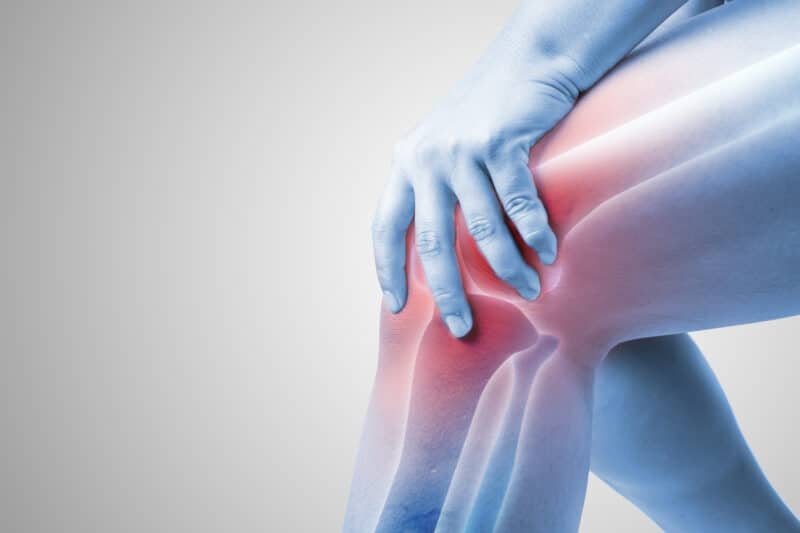
O Bruyère and colleagues (7) evaluated the efficacy and safety of a collagen hydrolysate supplement (1200 mg/day) versus a placebo in subjects with joint pain at the lower or upper limbs or at the lumbar spine. The results of the study suggest that collagen hydrolysate 1200 mg/day could produce an improvement of at least 20% as assessed by the visual analogue pain scale (VAS) in the most painful joints compared to a placebo.
Bello and Oesser (9) reviewed the literature regarding the use of collagen hydrolysate for the treatment of osteoarthritis (OA) and other joint disorders. Their findings showed that orally administered collagen hydrolysate has been shown to be absorbed intestinally and to accumulate in cartilage. The authors concluded that collagen hydrolysate has been shown to be safe and to provide improvement in some measures of pain and function in some individuals with OA or other arthritic conditions.
Collagen and Bone Health

Konig et al., (15) investigated the effect of 12-month daily oral administration of 5 g specific collagen peptides (SCP) (FORTIBONE®, GELITA AG) vs. placebo on bone mineral density (BMD) in postmenopausal women with primary, age-related reduction in BMD. The results showed that the intake of SCP increased BMD in postmenopausal women with primary, age-related reduction of BMD. In addition, SCP supplementation was associated with a favourable shift in bone markers, indicating increased bone formation and reduced bone degradation.
Collagen and Skin Health and Appearance

Choi and colleagues (11) performed a systematic review of the dermatological applications of oral collagen supplementation. Eleven studies with a total of 805 patients were included for review. Eight studies used collagen hydrolysate, 2.5g/d to 10g/d, for 8 to 24 weeks, for the treatment of pressure ulcers, xerosis, skin aging, and cellulite. Two studies used collagen tripeptide, 3g/d for 4 to 12 weeks, with notable improvement in skin elasticity and hydration. Lastly, one study using collagen dipeptide suggested anti-aging efficacy is proportionate to collagen dipeptide content. The authors concluded that the preliminary results are promising for the short and long-term use of oral collagen supplements for wound healing and skin aging. Oral collagen supplements also increase skin elasticity, hydration, and dermal collagen density. They further suggest that collagen supplementation is generally safe with no reported adverse events.
What is the Best Collagen Supplement?: What Is Vitamin C?
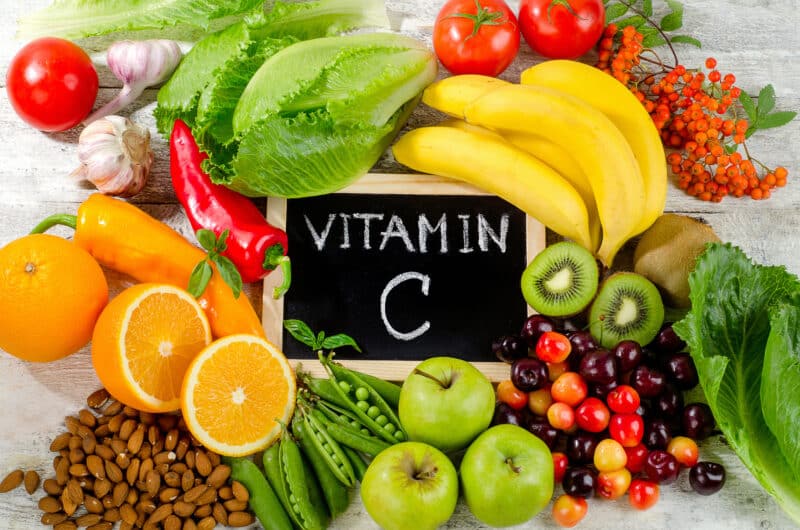
Vitamin C is a water-soluble vitamin found in plants, especially in fruits and leafy vegetables. It can also be produced synthetically.
How Will Vitamin C Benefit Me?
Vitamin C is essential for good health, as it plays an important role in the:
- Function of the immune system
- Production of energy
- Nervous system
- Absorption of iron
- Reduction of tiredness and fatigue
- Maintenance of normal psychological function
- Reduction of oxidative stress
Vitamin C is also essential for Collagen production. All Collagen starts off as a substance known as Procollagen. This is produced by the body by combining the amino acids glycine and proline using a process which involves vitamin C. Without Vitamin C, Collagen production is disrupted and as old Collagen is broken down, it cannot be replaced. We are unable to produce Vitamin C and so must rely on food and supplements to ensure an adequate intake.
A number of studies have demonstrated vitamin C’s important role in collagen production.
For example:
Boyera and colleagues (32) evaluated the effects of vitamin C on collagen biosynthesis and cross-linking at cellular and tissue levels. The results of the study showed that vitamin C induced a dose-dependent increase in collagen type I deposits by normal human fibroblasts (NHF). The authors concluded that exogenous vitamin C supply could thus contribute to the maintenance of optimal collagenic density in the dermis and locally strengthen the collagen network.
Does Adding Vitamin C To Collagen Make It More Effective?
Although vitamin C’s vital role in collagen production is well acknowledged, it would be reasonable to question whether consuming it with collagen has any additional benefits over just ensuring that an adequate dietary intake is maintained.
A number of studies have combined vitamin C and collagen with positive results (5,12).
For example:
Shaw and colleagues (5) investigated the effects of vitamin C–enriched gelatin (protein prepared from collagen) supplementation before intermittent activity on collagen synthesis. Eight healthy male subjects consumed either 5 or 15 g of vitamin C–enriched gelatin or a placebo control. One hour after the initial supplement, the subjects completed 6 min of rope-skipping to stimulate collagen synthesis. Subjects who took 15 g gelatin 1 h before exercise showed double the amino-terminal propeptide of collagen I in their blood, indicating increased collagen synthesis. The authors concluded that adding gelatin to an intermittent exercise program improves collagen synthesis and could play a beneficial role in injury prevention and tissue repair.
What is the Best Collagen Supplement?: What Is Bamboo Derived Silica?

Silica is a trace mineral made from a combination of silicon and oxygen. The body contains approximately 7 grams of silica, the majority of which is found in the skin, tendons, blood vessels, hair, and bones. Silica occurs naturally in many plants, such as leafy greens and whole grains and can also be found in the form of supplements or extracts. Bamboo extract is the richest known source of natural silica, containing over 70% organic silica, which is more than 10 times the level found in the widely used Horsetail plant.
How Will Silica Benefit Me?
Silica plays a vital role in normal formation of Collagen, bones, joints and cartilage. It also contributes to the healthy function of the skin, hair and nails, immune system, respiratory tract, vascular system, and skeleton.
A number of studies (34,35) have demonstrated the benefits of silica for collagen production and general health.
For example:
A review by Martin (34) highlighted silica’s essential in health, and noted that although no RDI has been established, deficiency induces numerous issues including reduced collagen and cartilage production, bone deformities, poorly formed joints and disruption of mineral balance in the femur and vertebrae.
A study by Barel and colleagues (35) investigated the effect of oral intake of orthosilicic acid (ch-OSA) (a water-soluble form of silica) on skin, nails and hair in women with photodamaged skin. The results of the study showed that oral intake of ch-OSA during the 20 weeks of the study resulted in a significant positive effect on skin surface and skin mechanical properties, and on brittleness of hair and nails.
What is the Best Collagen Supplement?: What Is Methylsulfonylmethane (MSM)?

Methylsulfonylmethane is a sulphur-containing compound with high bio-availability which occurs naturally in green plants and other food products, animals and humans. It can also be produced synthetically to create dietary supplements.
How Will Methylsulfonylmethane Benefit Me?
Sulphur is needed for many critical functions within the body and it is MSM that provides the sulphur that is required for optimum Collagen and keratin production. MSM has also has anti-inflammatory and anti-oxidant properties and has been shown to provide a range of other benefits including relieving joint pain (18, 19, 20), enhancing post-exercise recovery (21, 23, 24, 26, 27, 28), accelerating healing (29), and improving skin health and appearance (31).
Here are just a few examples of the many studies which demonstrate the effectiveness of MSM supplementation:
Collagen and Joint Health and Pain
Kim et al., (20) investigated the efficacy of methylsulfonylmethane (MSM) in the treatment of osteoarthritis (OA) knee pain. Fifty men and women, 40-76 years of age with knee OA pain were enrolled in an outpatient medical centre. The results showed that MSM improved symptoms of pain and physical function during the short intervention without major adverse events.
Xu and colleagues (18) investiagted the effects of MSM on joint function, symptoms of joint degeneration and the quality of life in aging populations. A total of 100 male and female participants over 50 years old who had at least one of the related symptoms of joint degeneration (joint pain, joint stiffness, joint swelling, difficulty walking, difficulty getting up from bed and difficulty going down stairs) were recruited and their symptoms of joint degeneration before and after the intervention were recorded. The results of the study showed that MSM shows positive effects in improving joint function, relieving symptoms associated with joint degeneration and improving the quality of life in aging populations.
Withee and colleagues (21) evaluated the effects of three weeks of MSM supplementation on muscle and joint pain after running a half-marathon. Participants were randomized to take either MSM (N=11), or a Placebo (N=11) at 3 grams per day for 21 days prior to the race and two days after (23 days total). The results of the study showed that three weeks of MSM supplementation at 3g/day attenuated post-exercise muscle and joint pain at clinically significant levels compared to placebo.
Collagen and Recovery from Exercise (including antioxidant and inflammatory effects)
Kalman et al., (26) investigated the effects of MSM on markers of exercise recovery & performance. In random order 24 moderately exercise-trained men (25.5±5.6 yrs) received MSM 3.0 gm/d or PLA, for 14 days, with a 17-day washout between. At the 1st visit, subjects performed stressing exercise; 28 total sets of leg extensions, sets 1-25, predetermined weight, 10 reps each, sets 26-28 to muscular failure at 70% 1-RM (performance). At the 2nd visit (48 hrs later), subjects performed 12 total sets of leg ext, sets 1-9, predetermined weight, sets 10-12 to muscular failure, 70% 1-RM (performance). The results showed that MSM may help alleviate the discomfort/pain that can follow a stressful exercise session.
A study by Van Der Merwe and Bloomer (25) investigated the influence of methylsulfonylmethane on inflammation-associated cytokine release before and following strenuous exercise. Physically active men were supplemented with either placebo or MSM (3 grams per day) for 28 days before performing 100 repetitions of eccentric knee extension exercise. The results of the study showed that MSM appears to dampen the release of inflammatory molecules in response to exercise, resulting in a less incendiary environment, allowing cells to still have the capacity to mount an appropriate response to an additional stimulus after exercise.
A study by Nakhostin-Roohi et al., (28) set out to determine whether single dose supplementation with MSM attenuates post-exercise oxidative stress in healthy untrained young men. Sixteen untrained men volunteered for this study. Participants were randomized in a double-blind placebo-controlled fashion into 2 groups: Methylsulfonylmethane (MSM) (n = 8) and placebo (n = 8). The participants took supplementation or placebo before running on treadmill for 45 min at 75% VO2max. The MSM supplementation was prepared in water as 100 mg/kg body weight. The results of the study suggest that single dose oral supplementation with MSM lowers exercise induced oxidative stress in healthy untrained young men.
Collagen and Skin Health and Appearance
Anthonavage and colleagues (31) investigated the effectiveness of methylsulfonylmethane (MSM) as an oral supplement on skin health using expert grading, instrumental measurements, and participant self-evaluation. The primary double-blind, placebo-controlled clinical trial randomized 20 female participants to receive either 3 g per day of MSM or placebo over 16 weeks. The results showed that MSM supplementation produced statistically significant improvements over placebo for wrinkle (crow’s feet) total count, length, severity, and deep line counts and for wrinkles (global) total count, length, and severity. The product was well tolerated, and overall, the MSM group gave more favourable self-assessment than the placebo group, though the improvement was not statistically significant.

Summary: Do I really need Time 4 Collagen+?
You may thinking do I really need Time 4 Collagen+ if I eat a well-balanced diet and have a healthy lifestyle? While it is true that the body produces collagen from substances available in our diet, as we age, we are able to produce less and it tends to be of a lower quality. As we have seen in this article, there are many studies to support the use of collagen supplementation, even in younger people. In addition, to high quality collagen, Time 4 Collagen+ provides you with unique combination of carefully selected ingredients which not only contribute to increased collagen production, but also provide a variety of other health and performance benefits.
